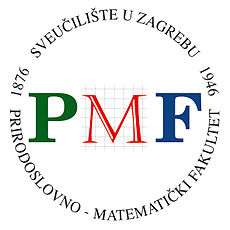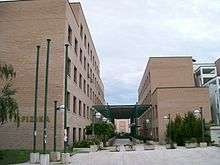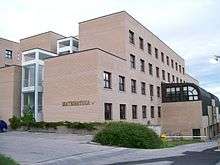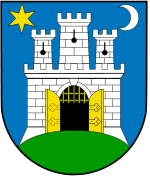Faculty of Science, University of Zagreb
|
Prirodoslovno-matematički fakultet Sveučilišta u Zagrebu | |
 | |
| Latin: Facultas Scientiarum Naturalium et Mathematicarum | |
| Type | Public |
|---|---|
| Established | 8 June 1946 |
| Dean | Prof. Zoran Curić, PhD |
Academic staff | 468 |
| Students | c. 6,000 |
| Location | Zagreb, Croatia |
| Campus | Horvatovac |
| Nickname | PMF |
| Website | pmf.unizg.hr |
Faculty of Science (Croatian: Prirodoslovno-matematički fakultet, abbr: PMF) is one of the faculties of the University of Zagreb.
The Faculty of Science of the University of Zagreb was established in 1946, although teaching started already in 1876. The faculty comprises seven departments, the seismological service, the mareographic and meteorological stations, and the Zagreb Botanical Garden. The Faculty has 288 full professors, associate and assistant professors, 180 junior researchers and about 6000 students. The Faculty offers undergraduate, graduate, and postgraduate study programmes, and pursues research in the fields of natural sciences and mathematics. The Faculty of Science is engaged in excellent cooperation with numerous universities and institutes abroad. Professors of the Faculty have been invited as visiting lecturers to European and American universities, and young staff members, as well as postgraduate students, are regularly sent to international universities and institutes for further research.
History
On 23 September 1669. Leopold I certified at the Jesuit Neoacademica Zagrebiensis, a three-year higher education institution, which gradually developed the studies of Philosophy, Law and Theology. At the Jesuit School philosophy was taught even earlier, and part of its first year studies were logic, physics, and metaphysics. Neither Jesuit School (until 1773), nor royal Regia Scientiarum Academica (until 1850) represented a real university. Croatian Parliament and Franz Joseph I of Austria, introduced the Law on founding the University of Zagreb. Soon after the establishing of the University of Zagreb, Faculties of Law, Theology and Philosophy started operating. The Chairs of the Faculty of Philosophy were appointed gradually. In the field of natural sciences the teaching started in 1876, with first lectures in mineralogy and geology, and then in botany, physics, mathematics, chemistry and zoology and geography. A long endeavour of the Science Department of the Faculty of Philosophy to attain the status of Faculty, finally materialized in 1946, when the Faculty of Science was established.
Departments

The Faculty consists of following departments:
- Department of Biology
- Department of Physics
- Department of Chemistry
- Department of Mathematics
- Department of Geophysics
- Department of Geography
- Department of Geology
Study programmes


The Faculty of Science has eight undergraduate study programmes (Bachelor degree) encompassing 3 years of studies (180 credits), 26 graduate study programmes (Master degree) encompassing two years of studies (120 credits) or five years of studies (300 credits) and seven postgraduate study programmes (PhD degree) encompassing 3 years of studies (180 credits). Education is at all levels characterized by teaching and supervision at a high academic level by staff actively involved in research. Departments of the Faculty are placed on several locations in Zagreb. The Departments of Physics, Mathematics, Geophysics, Chemistry, Geology, and the main administration of the Faculty are set at Horvatovac where a "campus of science" is being built. Departments of Biology and Geography are also going to be set at the same location in the near future.
The education of students in science and mathematics is a part of a comprehensive science education that qualifies them to work in research institutes, different branches of industry and production, the civil service (environmental protection, regional planning), public institutions (national parks, nature parks, reserves) and elsewhere, or as teachers in primary, secondary, and vocational schools.
List of study programmes
Bachelor of Science programmes (3 years study; 180 credits): Biology, Chemistry, Mathematics, Molecular Biology, Geography, Geology, Geophysics, Environmental Science.
Master of Science programmes (2 years study; 120 credits): Applied Mathematics, Chemistry, Computer Science and Mathematics, Ecology and Conservation, Environmental Science, Experimental Biology, Financial and Business Mathematics, Geography, Geology, Geophysics, Mathematics, Mathematical Statistics, Mineralogy, Molecular Biology, Pure Mathematics.
Master of Education programmes (2 years study; 120 credits): Chemistry, Mathematics and Computer Science, Geography.
Master of Science programmes (integrated undergraduate and graduate five years study; 300 credits): Physics.
Master of Education programmes (integrated undergraduate and graduate 5 years study; 300 credits): Biology and Chemistry, Geography and History, Mathematics and Physics, Physics, Physics and Chemistry, Physics and Computer Science, Physics and Technology.
Faculy also offers PhD degree programmes.
Notable affiliates
Alumni
- Dr. Tanja Bosak – professor at Massachusetts Institute of Technology
- Arsen Bauk – Minister of Public Administration (Croatia)
- Mladen Bestvina – professor at University of Utah
- Jakša Cvitanić – professor at California Institute of Technology
- Silvija Gradečak, PhD – professor at Massachusetts Institute of Technology
- Dragan Miličić – professor at University of Utah
- Dr. Aleksandra Radenović – professor at École Polytechnique Fédérale de Lausanne
- Dr. Ana Sunčana Smith – professor at University of Erlangen-Nuremberg
- Dr. Vernesa Smolčić – professor at University of Zagreb
- Dr. Iva Tolić – senior scientist at Ruđer Bošković Institute
- Krešimir Veselić – professor emeritus at University of Hagen

